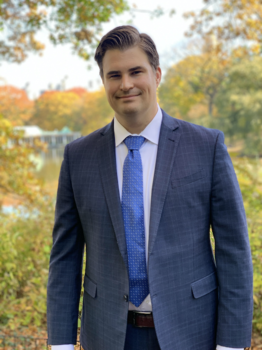Groundbreaking health policy research from Tyler Braun (Master of Health Policy, 2014) shines light on private-equity nursing homes.

When President Biden referenced Master of Health Policy alum Tyler Braun’s research during the 2023 State of the Union Address, it was the highlight of Braun’s career. President Biden cited Braun’s research as a basis for the President’s call for lawmakers to make health care more transparent for patients and their loved ones.
“As Wall Street firms take over more nursing homes, quality in those homes has gone down, and costs have gone up. That ends on my watch,” said Biden during the State of the Union, in direct reference to Braun’s research. The White House also included Braun’s study in a fact sheet on protecting seniors.
Braun is a leading expert on private equity investments in health care and studies how private equity ownership impacts the quality of patient care in facilities like nursing homes or rehabilitation centers. Private equity firms often invest and then sell the facilities in hopes of gaining a profit.
His groundbreaking study revealed private equity-acquired nursing homes had higher rates of preventable emergency department visits and hospitalizations than non-private-equity-acquired nursing homes, which is one of the first studies to shed light on how private equity investments affect patient care.
Braun credits his experience at Mason for giving him a platform to grow into a national researcher and health policy leader.
“Mason gave me the foundation of how to assess policy and understand the big picture on these types of events that take place,” Braun said. “Being from Northern Virginia and being in close proximity to Washington, DC, I found that Mason’s health policy program was very convenient and had a lot of great faculty members.”
During his time at Mason, Braun encountered many opportunities to grow his skillset and determine how he wanted to affect the health care field. He served as a graduate research assistant to Len Nichols, professor emeritus and former director of the Center for Health Policy Research and Ethics, which ignited his research interest from working in health care economics and health policy research with Virginia stakeholders on Medicaid expansion.
Through networking with stakeholders, policymakers, and collaborating with Mason faculty, he was encouraged to pursue a PhD to study health policy research at Virginia Commonwealth University. Soon, he became involved with the Department of Medical Administration Services, exposing him to the internal workings of Virginia Medicaid, health politics, and using data sources, like claims data, to answer critical policy-related questions.
“That put me in a very good position, and that wouldn’t have happened without the mentorship and the connections that Dr. Nichols gave me at Mason,” Braun said.
After obtaining his doctorate, he accepted a post-doc at Weill Medical College of Cornell University—just when a new phenomenon began in the health care industry: private equity acquisitions of health care facilities.
Private equity firms have a responsibility to make the largest return on investment for investors. In the past, private equity acquisitions of facilities were harder to identify if the amount fell below the threshold that required reporting the purchase to the federal government.
He developed a method for identifying private equity firms that were buying health care facilities and analyzing the quality of patient care.
As Braun expands his research portfolio and continues to change the health care field by increasing transparency on how private-equity investments affect the quality of patient care, he praises Mason’s Health Administration and Policy department for the valuable opportunities and connections he made.
“I had strong mentorship at Mason; It's a very close-knit department. Dr. Maddox, Dr. Kongstvedt, Dr. Gimm, and Dr. Nichols really contributed a lot to my personal and academic growth, along with the strong foundation that they gave me in my training to get to the point where I am today.”
Braun now works as an assistant professor at Weill Medical College of Cornell University, where his work not only informs health policy but also inspires future generations of health policy researchers.
“Reach out to the people in a career that you want to emulate,” Braun said to students seeking a similar career path. “Faculty members at Mason will help you throughout the journey and the direction you need to take.”
